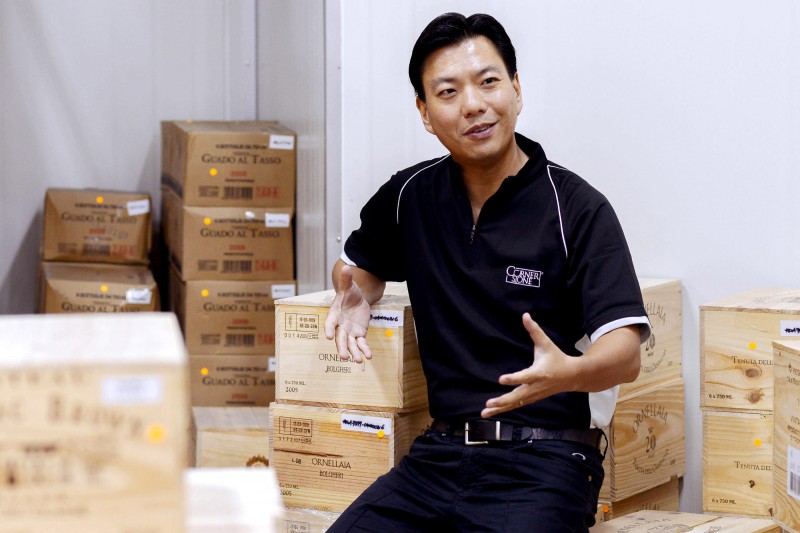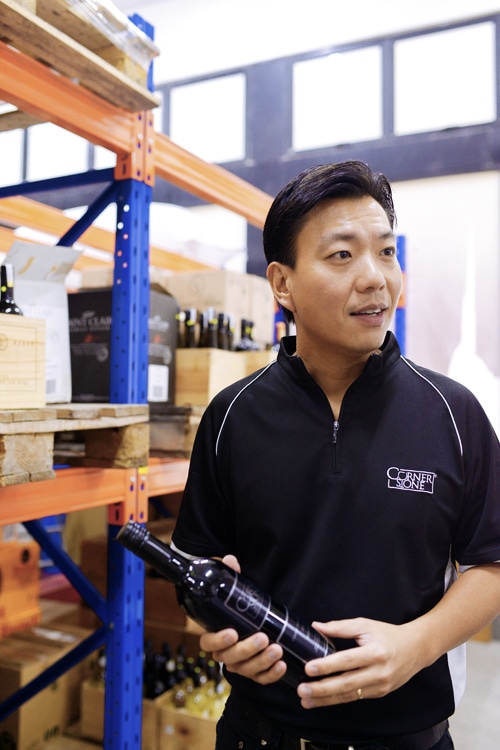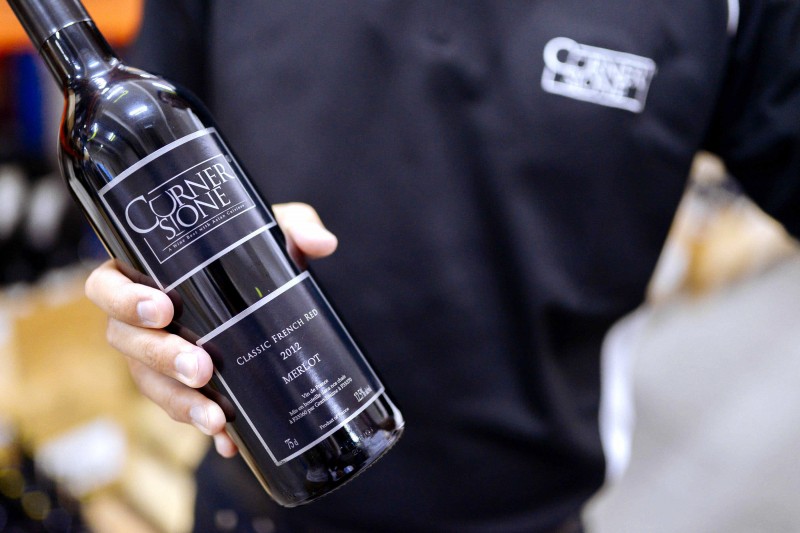Clinton Ang insists he is no gadabout, despite appearing as a regular fixture in Singapore Tatler and being photographed prominently at high society events. When I query him about the superficially pompous scene and what obscenely wealthy people prattle on about, he guffaws, claiming that he stays away from those who generally like to parade their feathers and boast about their latest purchases. “My wife [Tina] and I are very grounded people and we never seek media coverage,” he confesses, in an attempt to take the spotlight away from him. “Tina is quite gorgeous so her picture always gets taken. I am only inside, just to accompany her.” Clinton’s gregarious disposition stems from his family philosophy and overseas education in the States – the end result is a man with no airs, who knows everyone by name.
There isn’t a hint of opulence in his office. The décor is very minimalistic and styled in a no-frills manner – the floors are made of concrete industrial slabs giving off a warehouse appeal rather than the typical Shenton Way atmosphere. His space might appear bare to some, but Clinton feels more than adequate with his surroundings: on his left, is a shelf of Cornerstone wines – a label, which he created and developed in 1997 and on his right, hangs a board full of family photos – Cora, his 2-year-old daughter as the centrepiece.
Family happens to be a pivotal factor in Clinton’s career and personal life. As a 3rd generation leader of Hock Tong Bee Pte Ltd, Clinton has managed to successfully uphold his grandfather’s and father’s legacy, yet at the same time, cement his footprints in Asia as a leading wine and spirits distributor. When I ask about his biggest career milestone, he enthuses about Cora instead, proclaiming that nothing gives him more pride than the birth of his daughter. His smile widens, eyes twinkling with delight. “She makes me so happy every day and this is something money can’t buy.”
The Cornerstone logo was personally designed by Clinton and he wears it proudly in the form of a black polo tee shirt. Although the choice of garment might reflect his down-to-earth nature, like wine, he has different notes and the most alluring characteristic is how he combines boyish charm with the manners of an older gentleman. He pauses to take a sip of water, and then looks at me. “I always tell people that I have a lot of liquid assets.” We both laugh knowingly. It’s been a while since I’ve heard such a witty one-liner.
Conversations with Clinton Ang
WY-LENE YAP: Have you always wanted to take over the family business?
CLINTON ANG: I’m the youngest in the family so I thought that I could do my own thing. I have two older brothers and one sister. Growing up, I always looked up to my eldest brother but unfortunately; he decided not to join the family business –it’s a sad loss because my eldest brother was the most gifted when it comes to wine. My second brother, who was a corporate banker, joined around the same time [1997] as me – worked for 10 years, then left to answer a religious calling. My sister was never quite interested in the business but she sits on our board.
WY-LENE: So it kinda fell into your lap.
CLINTON: Yeah, out of all my siblings, I drank the most. So my father told me that I might as well drink my own and not other brands.
I come to work every day with the aim of working myself out of a job, as ultimately, I don’t want the company to be increasingly reliant on me.
WY-LENE: What’s your approach towards running a family business?
CLINTON: As an employee/managing director/chairman (of the board) and majority shareholder of the company, I execute decisions in the best interests of the company and my siblings know that I’m generally a tough guy. I don’t do things to appease them but rather for the sustainability and continuity of the business. I come to work every day with the aim of working myself out of a job, as ultimately, I don’t want the company to be increasingly reliant on me. My team is very empowered and they make things happen – to me, that is the only way we can continue to scale up. Today, my sales team makes 3 to 4 times more than what we used to 5 years ago.
WY-LENE: You run your company in a very Americanised way, where it is pretty much quite flat.
CLINTON: Yes, because it is all about opportunity. My role is to be their foundation, support system and macro strategist. I do a little bit of micro but very selectively as I still need to know what’s happening on the ground. I also meet one customer a day to understand the heartbeat of the industry.
WY-LENE: How did you manage to grow the business when you first started out in 1997?
CLINTON: 1997 was a very difficult time. Every business has its peaks and troughs. During the 90s, a lot of MNCs started to setup their offices in Singapore and they took away our agencies and exclusivities. In addition, from 1990 to 1997, the economy was quite bad. Our growth only started from 2000 onwards.
I remembered fondly about the chopsticks theory: if you take a pair of chopsticks and try to break it, it will be very easy. But if you take a bunch of chopsticks, it will be much harder.
WY-LENE: What kind of strategies did you use?
CLINTON: My father and grandmother always spoke about business at the dinner table. And I remembered fondly about the chopsticks theory: if you take a pair of chopsticks and try to break it, it will be very easy. But if you take a bunch of chopsticks, it will be much harder. Their idea was to group together all the best independent family distribution companies in the region – under some level of cooperative, so that there is economies of scale, some level of stickiness and strength in numbers/unity. Everyone knows our company in the region because we are the oldest surviving wine merchants. So I went to these companies and shared with them my philosophy and passion and they said to me, “I believe in the company, but I believe in you more.”
WY-LENE: Which countries did you approach?
CLINTON: We are in 28 countries now and Singapore is our head office. We have joint ventures in Malaysia, Thailand, Hong Kong, Macau, China and Taiwan. The rest are distributors, until they are ready for a JV.
WY-LENE: Was wine a huge part of your life when you were growing up? And was your first sip really at the age of seven?
CLINTON: My father always had a bottle of wine on the table – it was his way of getting us involved. He would ask my brothers and sister: What do you see? What do you smell? What do you taste? Because of the huge age gap between my siblings, I was never involved. So at seven, I grabbed a glass, drank it – face turned red and fell onto the floor. After that, my mum told my father to include me.
WY-LENE: Do you drink a lot of wine on a daily basis?
CLINTON: Well, I taste wines every single day. In the world of wines, you have the value wines which don’t really mature with age. The mid-tier and high-end ones do evolve and get more complex. Fortunately, I get to taste the mid-tier/super high-end ones on a daily basis to see how they evolve. And being in the wine business, I get invites to lunches and dinners all the time. Why? Because all my friends know that whenever you invite Clinton, he brings good wine. [laughs] A good bottle of wine can cost more than an entire meal.
WY-LENE: You have not gone a day without drinking wine then.
CLINTON: I generally have a bottle (opened) in my fridge and my wife and I like to have a glass every day – it’s a real pleasure. My daughter has started to smell the wines too. When I allow her to have a tiny taste on her palate, she goes “mmmm.”
WY-LENE: [laughs] It runs in the family. Would you describe yourself as a wine connoisseur?
CLINTON: It depends on your definition. Twenty years ago, the French made wines in a very specific style, the Australians also made wines in a very specific style. As a connoisseur, it was much easier to taste wines blind. However, today, the world of wines is so diverse. French winemakers go to Australia, vice versa. In terms of wine styles, it can be very different. So I dare say that I am a wine professional instead of a connoisseur – if I bring a “curveball” to a connoisseur, he will get it wrong.
WY-LENE: Is that so?
CLINTON: Oh yes. It will be hard to tell if I bring something very different.
WY-LENE: How about a sommelier? He will get it wrong too?
CLINTON: Absolutely. They don’t make wines in a specific style anymore and there are a lot of variations. Unlike whisky, there are certain laws: depending on the water, how it is being made, what is it made with etc.
WY-LENE: Do you think that wines are losing their essence because of the way they are being made now?
CLINTON: There are two sides to a coin. For the purists, who like tradition, there are still winemakers that produce it in the old style. It’s purely up to the consumer. There is a wine for every occasion and it is a bit like Ben & Jerry’s.
WY-LENE: They have really weird creations.
CLINTON: [laughs] They do!
WY-LENE: Which do you prefer red or white?
CLINTON: Definitely, red. You can keep reds (Grand Crus) for an extended period of time and allow them to evolve. It’s not the same with whites because they don’t have the different levels of paradigm and flavour profiles.
Although the wine business contributes to less than ten percent of our family’s profits, it is a historical part of our business.
WY-LENE: You are so passionate about wines.
CLINTON: Of course. But more importantly, I am also passionate about the family business and upholding our family name. Although the wine business contributes to less than ten percent of our family’s profits, it is a historical part of our business. It’s sizeable but the wine business (depending on the cycle) does not derive a lot of profits anymore. Brick-and-mortar businesses are very tough and you get normalised profits.
WY-LENE: What was your net profit for 2014?
CLINTON: Around 3 million.
WY-LENE: Did you always want to have your own label?
CLINTON: In 1997, I started writing and speaking about a lot about wines. Subsequently, I realised that Asians liked wines in a specific way. They are not fond of tannin, and when it is too dry. They prefer aromatic wines, so I decided to make our own. We started with one red and one white from France and we sold 12,000 bottles that year. Today, that is our number one revenue generator and we sell over 2 million bottles in the region.
WY-LENE: What makes Cornerstone unique from the rest like Sarment or Penfolds?
CLINTON: It is a wine made by an Asian for Asian cuisine. If you go to a supermarket and pick up a bottle that is $20 and below, you will likely see the words: wine may contain traces of nut and various other things. That’s very bad because a lot of big companies cut a lot of corners in order to maximise profitability. Cheap wines that you find at the supermarkets – look like wine, probably smell a bit like it but taste like crap. It’s just not wine. Hence, I always promote wines that are owned by families because they have a philosophy and commitment to make things the traditional way. All our wines are made the traditional way. We have 28 different types and every single one of them has a certain taste profile.
WY-LENE: You came up with all of them?
CLINTON: Yeah, pretty much. I have a bottle that pairs well with Hainanese Chicken Rice, another for Char Kway Teow and even an ice wine that goes perfectly with Thai Mango Coconut Rice.
WY-LENE: Which is the most popular one?
CLINTON: Our ice wine. It is made in New Zealand and there is 25 percent less sugar than your normal ice wine. Basically, it’s diet ice wine. We have four brands now. Cornerstone is our main brand, Vino+, XII Degrees and finally, Cora – named after my daughter. Cora is targeted for women and we are making a sparkling Moscato and Prosecco with gold flakes (inside).
WY-LENE: So many women will be instagramming that! Ultimately, what’s your drink of choice?
CLINTON: Champagne.
WY-LENE: What kind of champagne?
CLINTON: I am not so particular whether it is Brut or Rosé. But a Brut non-vintage champagne will be perfect. Champagne is something that you can drink from dawn to dusk and it makes you feel good.







